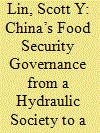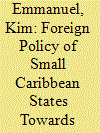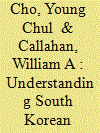|
|
|
Sort Order |
|
|
|
Items / Page
|
|
|
|
|
|
|
| Srl | Item |
| 1 |
ID:
189018


|
|
|
|
|
| Summary/Abstract |
Although the main purpose of food security governance in China is to increase grain yield, the traditional and contemporary methods employed to achieve food security governance differ in polemic terms. The traditional method relies on organizations such as peasant collectives to properly manage water and other natural resources on farmlands. The food security governance of traditional China can best be described as a “hydraulic society”. Shifting from a pre-capitalist to a capitalist model, the contemporary method is centered on several large-scale agricultural and food (A&F) corporations and involves the capitalization of grain production resources, genetic modifications of grain seedlings through science and technology, and intensive scales of grain production. A “corporate food regime” is, therefore, what best defines the governance mechanisms of food security in contemporary China. This paper aims to examine how the governance of food security has been reshaped by this emerging corporate food regime. Findings indicate that China’s food security governance has transformed into a corporate food regime to increase grain yield. In this regime, the Chinese government supports the establishment of a few large-scale A&F corporations, allowing them to have an oligopoly over the domestic grain market. Internationally, China has become a major investor through its transnational agricultural land grabbing. The formation of this new food security governance has not only affected the traditional Chinese culture of peasant collectives, but also challenged the global A&F market system. However, COVID-19 and the promulgation of the Biosecurity Law are likely to alter the development of China’s A&F corporations and its food security governance.
|
|
|
|
|
|
|
|
|
|
|
|
|
|
|
|
| 2 |
ID:
189020


|
|
|
|
|
| Summary/Abstract |
The Indo-Pacific region and its politics are now in obscurity, and the power dynamics of US-China competition have become well settled within a new concept of geopolitics. As an economic giant and a distinct power in IR, the EU’s position and strategy in the region are garnering attention. This paper starts by discussing the EU’s perceived systemic rivalry with China and its falling out with the United States, its Atlantic ally since the two World Wars. It then introduces the concept of Europe as a normative power in order to better understand the EU’s policies. It points out how “Normative Power Europe” (NPE) has adapted to its surroundings by introducing the concept of principled pragmatism concept in 2016. The paper then lays out the EU’s security strategies in Asia and highlights its narrative of strategic autonomy, referred to as the Sinatra doctrine. From there, it employs the notion of NPE and principled pragmatism to delineate the EU’s unique stance in the Indo-Pacific region and how it puts this principled pragmatism into practice. Finally, it analyzes how the EU has strategically applied these concepts to succeed in its own way amidst US-China competition in the Indo-Pacific.
|
|
|
|
|
|
|
|
|
|
|
|
|
|
|
|
| 3 |
ID:
189021


|
|
|
|
|
| Summary/Abstract |
Conventional wisdom suggests that small states’ foreign policies are constrained in several ways. These may be confined to size, material resources, geopolitical positioning and limited participation in inter-state affairs. Yet, despite their diminutiveness, small Caribbean states appeared to have acted with surprising dynamism in seeking to promote and uphold relations with China in an unlikely period, the bipolar era. Drawing from official records of their interactions and other documentary sources, these states showed themselves to be quite willing to transcend their various limitations and become rather active participants on issues aligning with their interests in the international sphere. This paper examines how policy-making between the Caribbean region and China unfolded and why it evolved the way it did. It argues that acting through the more ideational context of the Cold War era, policymakers within the Caribbean region implemented strategies and policies premised on shared ideals of Third World solidarity to further relations with China. In embarking on this analysis, two main contributions are envisaged. First, the paper addresses the knowledge gap on small Caribbean states’ foreign policy decision-making vis-à-vis China in the Cold War era. Second, interrogating the dynamic provides a unique opportunity to challenge the received wisdom on small states’ foreign policy behavior in line with an emphasis on small states agency amidst internal and international constraints.
|
|
|
|
|
|
|
|
|
|
|
|
|
|
|
|
| 4 |
ID:
189019


|
|
|
|
|
| Summary/Abstract |
This study aims to examine South Korean middle power diplomacy discourses using premodern Korea’s diplomatic thinking-cum-practice of sadae (serving the great) as a heuristic device. It is argued that current discourses of South Korea as a middle power resonate with sadae because they strive to secure the existing liberal international order led by the West and the United States. It also argues that it is both necessary and healthy for South Korean middle power diplomacy studies to denaturalize its self-evident faith in the existing liberal international order—a not universal but particular order among several possible others in history—with South Korea celebrating and appropriating liberal values. This would prepare South Korean middle power diplomacy research to tackle uncertainty, difference, and pluralism in global politics while producing more responsible and responsive scholarship in international relations.
|
|
|
|
|
|
|
|
|
|
|
|
|
|
|
|
|
|
|
|
|